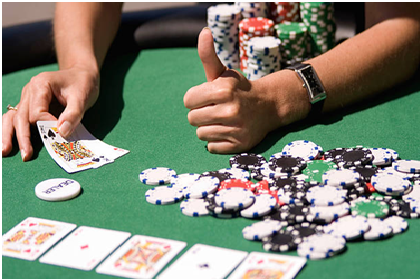Do you want to be a successful poker player? If yes, then you need to have the right strategies in place. You can take home more pots than your opponents with the right tactics and techniques and come out ahead. So read on and start honing those skills!
Do you want to be a successful poker player? If yes, then you need to have the right strategies in place. You can take home more pots than your opponents with the right tactics and techniques and come out ahead. So read on and start honing those skills!
1. Learn the Basics of Poker
By having a solid understanding of the rules, betting structures, poker hand rankings, and common poker terms, you’ll be well-equipped to navigate through the game with confidence. As you grasp these fundamental aspects, you pave the way to develop your poker strategy and sharpen your intuition for reading your opponents’ moves.
Practice and determination are critical to refining your skills in this enticing game of skill, luck, and psychology. Remember: a solid foundation in the basics sets the stage for a winning poker player. So, study them thoroughly, hone your abilities, and soon you’ll be well on your way to dominating the table and making impressive plays one hand at a time.
2. Take Advantage of Free Online Poker
Poker enthusiasts often dream of taking home the pot and leaving their opponents speechless. The key to realizing this dream is mastering various tactics and strategies. Playing free poker games online is one highly effective way to hone your poker prowess.
Participating in these risk-free games allows you to familiarize yourself with poker rules and explore diverse play styles. Plus, you’ll get a feel for how to adapt to different situations and respond to the ever-changing dynamics at the table. In no time, you’ll be well-equipped to outsmart your opponents and confidently take home the pot.
3. Create a Poker Bankroll
A fundamental step toward success at the poker table involves creating a poker bankroll. This means setting aside a specific amount of money that you’re comfortable risking at the poker table and never dipping into funds designated for other responsibilities or expenses.
Establishing a clear distinction between these funds ensures that you remain level-headed and stress-free when indulging in the exhilarating world of poker. By building a separate poker bankroll, you not only provide yourself with a cushion to absorb any losses, but you also cultivate a disciplined mindset that can enhance your overall performance in the long run.

Photo by iStockphoto
4. Practice Proper Etiquette
Following proper poker etiquette is essential when playing the game.
First, don’t take too long to make a bet—nobody wants to wait around while you ponder your move.
Second, always remain respectful while engaging in table talk.
Third, never act out of turn or before it’s your go. It can throw other players off and disrupt the game’s flow.
Finally, never talk about your cards or speculate on what other players have in their hands, as this could drastically influence the outcome of the current hand.
Be mindful of your words and actions to ensure an enjoyable experience for everyone at the table.

Photo by iStockphoto
5. Play According to Your Position
In the early position, it’s crucial to play a tight, cautious game, as there are many unknown decisions to follow by other players. Due to this lack of information, sticking to a conservative approach and playing only the strongest hands is more likely to yield success.
On the other hand, playing in a late position grants you the advantage of observing and interpreting your opponents’ actions before you make your move. This valuable insight lets you loosen up your play, capitalizing on weaker hands and deploying a more aggressive strategy against your opponents.
Adapting your strategy to your position will keep your opponents guessing and increase your chances of outsmarting them in the quest for poker dominance.
6. Manage Your Emotions
Commanding the poker table tests skill and emotional resilience. If you aspire to be a master player, managing your emotions is crucial in hauling in the pot. Stay grounded and focused on the task, ensuring that minor setbacks and bad beats don’t sway your attention from the ultimate goal. Embrace a level-headed approach, maintaining a calm demeanor even in the face of adversity.
7. Review Your Games
Mastering the art of poker requires constant dedication and a willingness to learn from experiences. Don’t just brush off a loss or revel in a win; invest a few minutes after each game to meticulously analyze and dissect your hands. By doing so, you’ll be able to pinpoint and bolster your strengths while also identifying your weaknesses and working to eradicate them.
Remember, as a finely crafted sword is sharpened over time, so does your poker prowess. By dedicating time to analyzing your game, you’ll undoubtedly witness a surge in your successes, and soon enough, the pot will be yours for the taking.
8. Take Breaks
Even the most skilled players can be prone to mental fatigue, which could negatively impact decision-making abilities and the ability to read opponents. By stepping away from the table occasionally, you’re giving your mind a chance to recharge, ensuring you return to the game revitalized and focused.
These brief intervals will enhance your mental alertness and help regulate your emotions and prevent tilt or other adverse reactions to challenging situations. Ultimately, taking breaks lets you maintain a confident and effective performance, increasing your chances of outwitting your opponents and securing those winnings.
Conclusion
Poker is complex and intricate, but you can conquer it with the proper knowledge, dedication, and practice. The above tips provide a solid foundation to build your poker career. Success will follow if you take these pointers to heart and consistently apply them throughout your games. Start playing your favorite game today—Texas Hold’em or any other variant—by signing up at GGPoker, the world’s largest poker room!











Leave a Reply